Home
YAESU FT-100D VFO Repair
- Details
- Written by: ik1hge
- Category: Electronics and radiofrequency
- Hits: 31
After a long break in the 1990s, in the early 2000s I decided to return to amateur radio. Unfortunately, room availòability and roof access issues prevented me from using my trusty Kenwood TS-830M, which I bought when I was 15 or 16 with my life savings. So I decided to buy a so-called "quad-band" transceiver, a transceiver that covered all MF and HF bands, VHF (50 MHz and 144 MHz), and UHF (430 MHz). I then purchased a second-hand YAESU FT-100D from a well known shop in Asti (Italy), that many of us, Italian radioamateurs, are undoubtedly familiar with. It's a very comfortable radio to use, still valid today, with a few flaws, it's true, but also many advantages. Over the years, some problems have arisen, common to all devices of this type, including a problem with the optical encoder that controls the VFO. It happened that, when continuously rotating the VFO knob, the frequency would vary somewhat in spurts, that is, regularly for most of a complete rotation, then it would lock on one frequency and then resume varying normally. To solve this problem, the simplest thing to do is to replace the VFO's optical encoder, which I found to be a fairly simple operation, certainly within the reach of many radio amateurs with some familiarity with mechanical assemblies. This doesn't require extensive electronics knowledge, as long as you know how to unplug, and plug in back, a connector.
Required Materials
First, we need the spare part. I purchased it a long time ago from the Italian distributor of the Yaesu brand because it was easy for me to quickly get one for another purchase, but you can also buy it from any electronics component distributor. The price is more or less the same, just under thirty euros, if I remember correctly. Be aware that the model you purchase from a generic distributor may not have the connector pre-installed; if you're unable to find and install the connector yourself, buy the official Yaesu spare part, which, as I said, won't cost much more.
The encoder you need is this: COPAL RES20D50-201-1D (instead of COPAL, you might find the NIDAL brand; don't worry, it's the same thing). These encoders were originally made in Japan, but production recently moved to Vietnam.
That's all there is to it with the spare parts. As for the tools, you'll need a Phillips screwdriver. Hear ye hear ye: you don't need a soldering iron!
Recommendation
Hey, I know that when I start with recommendations, I'm as annoying as my old Aunt Rita; read them, don't read them, do what you want, just as long as if something bad happens to your radio, you don't come whining to me... When working on electronic boards, or even just getting within a few inches of them, you must wear primary electrostatic discharge protection, namely the infamous ESD wristband, which must be connected to electrical ground via a power resistor with a resistance between 1 MΩ and 2 MΩ. Furthermore, the surface you're working on must also be "ESD safe," meaning at least static-dissipative, and connected to electrical ground in the same way as the wristband. Finally, the surface should be smooth and soft so as not to scratch or damage the object you're repairing. In short, if you don't already have one, buy an ESD wristband and an ESD mat and connect them to the electrical ground. The resistor should already be included in the kit you purchase. Remember to wear the bracelet properly (the metal part in contact with the skin on your wrist) and always; don't be like me and put it aside at the first opportunity and then forget about it...
Caution: ESD-induced failures aren't always destructive; they often only cause "soft failures," failures that appear sporadically and under certain operating conditions, such as when the DX you've been waiting for your whole life calls your callsign. Again, don't panic: you'll certainly have another chance to connect that ATNO1 in another thirty years, plenty of time to even buy an ESD protection kit in China.
Step-by-step instructions
ER/IK1HGE on air now
- Details
- Written by: ik1hge
- Category: Moldova ER/IK1HGE
- Hits: 13
ER/IK1HGE is on air from Nisporeni, Moldova, in August 2025.
Good DXing!
Roberto
8Q7HR operations from Maldives
- Details
- Written by: ik1hge
- Category: News
- Hits: 1373
The QSL cards via bureau are leaving
- Details
- Written by: ik1hge
- Category: Moldova ER/IK1HGE
- Hits: 743
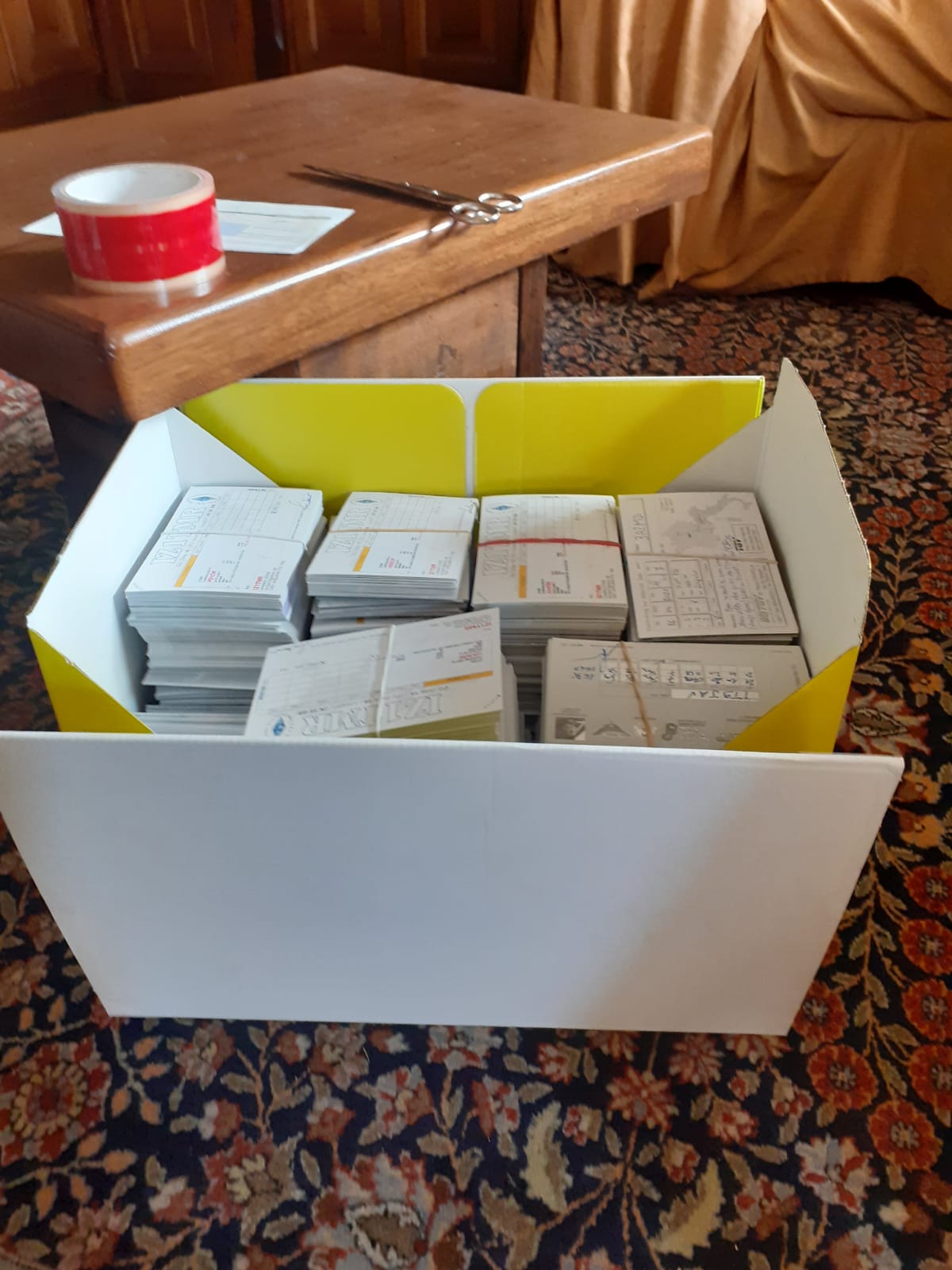 Paolo, the QSL manager of the local radio amateurs' club informs that the outbound QSL cards are leaving to ARI italian bureau service headquarter. Since I missed the timeframe for the previous shipment, there are several hundreds QSL cards from IK1HGE and ER/IK1HGE this time. If I received your card for a QSO with ER/IK1HGE via bureau, I'm now confident that in two or three years you will receive my one. However, I must also say that since 2019 operations from Moldova, probably due to the pandemic situation I received quite a few cards so it is reasonable to think that I did not get your one yet and that you won't get your confirmation for another 3 to 5 years.
Paolo, the QSL manager of the local radio amateurs' club informs that the outbound QSL cards are leaving to ARI italian bureau service headquarter. Since I missed the timeframe for the previous shipment, there are several hundreds QSL cards from IK1HGE and ER/IK1HGE this time. If I received your card for a QSO with ER/IK1HGE via bureau, I'm now confident that in two or three years you will receive my one. However, I must also say that since 2019 operations from Moldova, probably due to the pandemic situation I received quite a few cards so it is reasonable to think that I did not get your one yet and that you won't get your confirmation for another 3 to 5 years.
ER/IK1HGE Moldova activity 2021
- Details
- Written by: ik1hge
- Category: Moldova ER/IK1HGE
- Hits: 708
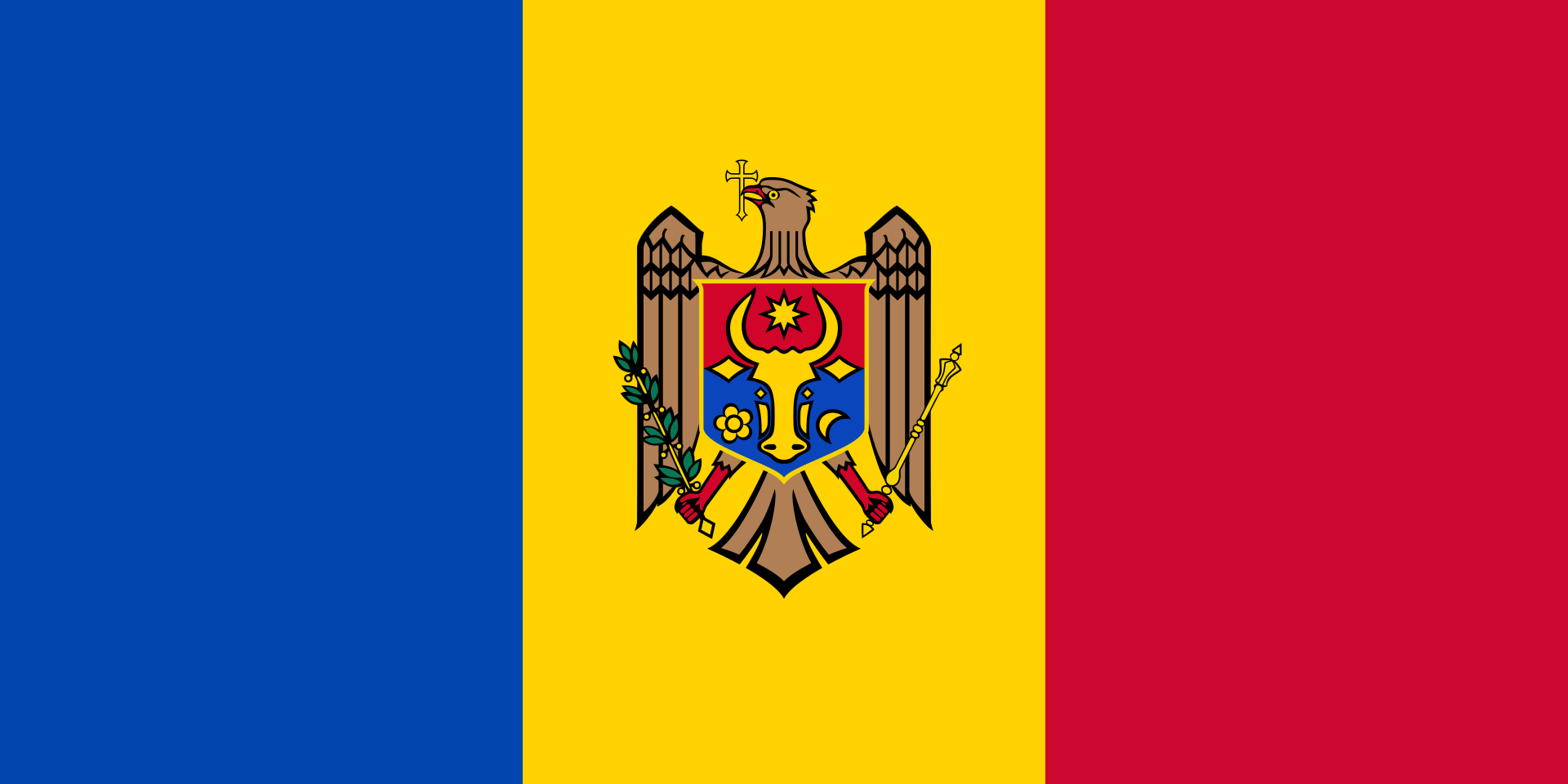 QRT QRT QRT QRT !
QRT QRT QRT QRT !
Sept. 3rd, 2021. 73 de ER/IK1HGE
It's time to send your direct QSLs or OQRS ClubLog.
See you next year!
--------------------------------------------------------------------------
I'm operating from Moldova. CW, SSB and digital modes.
..............................................................................................................................
I plan to be active from Moldova as ER/IK1HGE in summer 2021, presumibly in August.
HF bands from 80 m to 10 m, 6 m, CW and SSB. I'm preparing my equipment to be active also in several digital modes including, but not limited to, FT8 and FT4. I'll let you know.
----------------------------------------
I do not authorize anybody to:
- publish this article
- report information published in this article
- communicate my personal data (including my last name and address)
I authorize everybody to:
- link this article from their web sites
- communicate who is the author in the following form: "ik1hge Roberto".
------------------------------------------
Credits Flag of Moldova image:
By Nameneko and others - vector coat of arms image traced by User:Nameneko from Image:Moldova gerb large.png. Construction sheet can be found at http://flagspot.net/flags/md.html#const, Public Domain, https://commons.wikimedia.org/w/index.php?curid=433231
Tom's files for Rufzxp and CW Player
- Details
- Written by: ik1hge
- Category: CW resources
- Hits: 955
Files to be used with RufzXP in training mode or CW Player
If you need instructions on how to load the files in RufzXP, read the article How to use RufzXP in trainer mode
The following files are prepared and offered to you by Tom, DF7TV. Click here to download the "Read me reference" by Tom with credits and everything you should know...
Letters
The following files contain meaningful English words. The words in each file have a random length but are not longer than specified in the description.
| 1 to 3 letter words | TXT | 213 words |
| 1 to 4 letter words | TXT | 484 words |
| 1 to 5 letter words | TXT | 499 words |
| 1 to 6 letter words | TXT | 1991 words |
| 1 to 7 letter words | TXT | 2570 words |
| 1 to 8 letter words | TXT | 3057 words |
| 1 to 9 letter words | TXT | 3425 words |
| 1 to 10 letter words | TXT | 3722 words |
| 1 to 11 letter words | TXT | 3900 words |
| 1 to 12 letter words | TXT | 3984 words |
| 1 to 13 letter words | TXT | 4000 words |
More words files
| 100 words | TXT | |
| 200 words | TXT | |
| 500 words | TXT | |
| 1000 words | TXT | |
| 2800 | TXT | |
| 4054 | TXT |
Here you are the link to Tom's CW page (a new window will be opened because the page is hosted by another web site): https://www.qsl.net/df7tv/morse-code-training.html
Source and credits:
The "-WORDS-" files in this archive are based on the NGSL and TSL lists (see below).
They are useful in exercises to become more proficient in Morse Code.
(Additionally they will be of help to learners of English as a second language -- ESL)
73
Tom DF7TV
February 4, 2021
--
NEW GENERAL SERVICE LIST:
Browne, C., Culligan, B. & Phillips, J. (2013). The New General Service List. Retrieved from http://www.newgeneralservicelist.org
--
TOEIC SERVICE LIST:
Browne, C., and Culligan, B. (2016). The TOEIC Service List. Retrieved from http://www.newgeneralservicelist.org
How to use RufzXP in trainer mode
- Details
- Written by: ik1hge
- Category: CW resources
- Hits: 2094
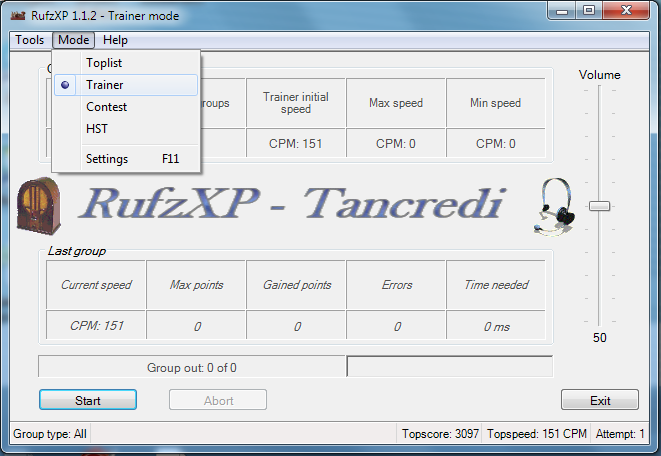 This tutorial shows how to load a custom words file in RufzXP instead of the normal callsigns database.
This tutorial shows how to load a custom words file in RufzXP instead of the normal callsigns database.
- You must already have RufzXP installed in your PC and workable
- Run RufzXP
- Click on "Mode", then click on "Trainer" in the drop down menu
- Click again on "Mode", then click on "Settings", the "Trainer settings" window suddenly pops up
- In the "Trainer settings window" click on "Load callbase", a dialog window pops up to let you select the custom file that you want to load. It must be a plain text file with the ".txt" extension. You can find the custm files that I prepared for you here: Files for Rufzxp and CW Player
- Navigate in your folder structure until you find the custom file that you want to load and select it, then click on "Open" in the same dialog window; the dialog window disappears
- In the "Trainer settings" window, under "session length", you can enter the "Number of groups per attempt"; I would enter 50 or so; alternatively, you might prefer to use the timer
- In the top right part of the "Trainer settings" window, you can select the speed increment that you want: "Fixed" (no increment), "Incremental" (specify the percentage of speed increment in the field below) or "Variable", which is the standard mode for RufzXP
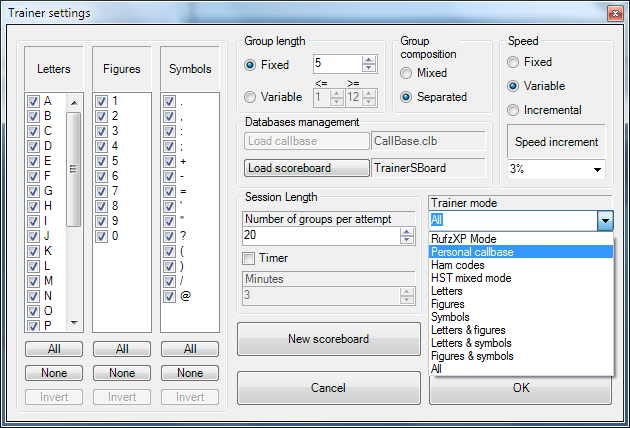
- In the "Trainer settings" window, bottom right part, click on "OK"
- In the RufzXP main window, start a new attempt as usual.
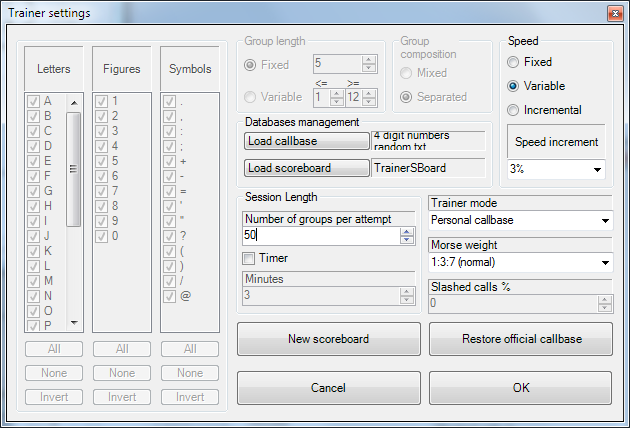
Source: ik1hge
Contest activity IK1HGE
- Details
- Written by: ik1hge
- Category: News
- Hits: 1155
This is one of those tables that I start filling in one of those infrequent days when the good will is plentiful, and that I wish to update from time to time. I hope to fullfil my commitment…
- CW QRS CONTEST (en)
- K1USN’s New Weekly Slow Speed Test
- Quagi pictures
- Spectrum Software: the simulation software Micro-Cap is now free (alternative download)
- New Year's Day curiosity about RufzXP
- 100W UHF 400--470MHZ Amplifier Power Amplifier Board For Ham Radio DIY Kits (English version)
- Where are the application forms for WAIP award?
- My hex beam
- ER/IK1HGE. QRT for 2019. Send your QSL cards now.
- Moldova: Activity 2019 ER/IK1HGE
- HF choke balun homebrewing (1:1 current mode balun)
- Sunspots number forecast and hf propagation prediction
- G3TXQ Silent Key
- Replacement of RJ45 modular mic connector
- Emergency earthquake Abruzzo 2009 (Italy)
- HEXBEAM
- Italian radio amateurs now on 60 meters band (5 MHz band)
- ER/IK1HGE QSLing
- Yaesu FT-450AT for sale
- ER/IK1HGE 2018 operations completed
- Online DXCC - how much is it?
- High voltage anode power supply 3500 - 4000 V
- ER/IK1HGE Moldova
- The legend of the letter to ARRL to subscribe to Logbook of the World (LotW)
- How much does a Skylab antenna gain? (alias Starduster M-400)
- 70MHz 4 elements Quagi antenna
- Quagi 8 elements 432MHz
- Moncalvo amateur radio flea market 2018
- ik1hge.com on the road again!
Page 1 of 5


